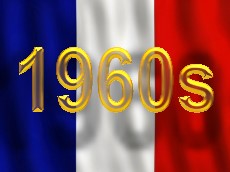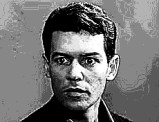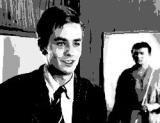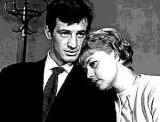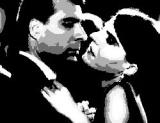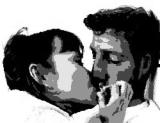Split or Die
The arrival of the French New Wave in the late 1950s brought about a dramatic schism in French cinema that endures to this day, sustained by state subsidy and raw talent. To fend off the threat posed by its American counterpart and television in the 1960s, French commercial cinema upped its game massively, with bigger budgets and manufactured megastars to draw ever larger audiences, mirroring the Hollywood system. The decade's biggest hit was Gérard Oury's La Grande vadrouille - with its 17.3 million audience this remained the most popular French film for over forty years. In parallel, independent auteurs were thriving, attracting most of the critical attention and a fair amount of public attention with their more modest films dealing honestly with social, political and personal concerns. This stark dichotomy, now deeply embedded in the soul of French cinema and a key reason for its success, is reflected in what became of the leading lights of la Nouvelle Vague. Some sold out to commercial cinema (Truffaut, Chabrol) whilst others stuck to their auteur credentials (Godard, Rivette, Rohmer). These two poles of French cinema are what ensured its survival as the film industries of most other European countries went into terminal decline. For a more complete list consult our best films index and complete films index.Le Trou (1960)
Becker's final film is his best, an uncompromisingly hard-edged realist portrait of a prison break-out attempt, offering a compelling study of human nature.Read full review...
Plein soleil (1960)
The talented Alain Delon plays the original Mr Ripley in this sumptuous yet chilling adaptation of Patricia Highsmith's thriller novel.Read full review...
Moderato cantabile (1960)
A frustrated housewife witnesses a murder and places herself in the power of s stranger to relive the same drama. A haunting elegy in self-realisation magnificently portrayed by Jeanne Moreau.Read full review...
Tirez sur le pianiste (1960)
The first and best of Truffaut's crime thrillers captures perfectly the mood of the American film noir and stars Charles Aznavour in probably his best screen role.Read full review...
L'Année dernière à Marienbad (1961)
A love triangle set in a baroque mansion offers a haunting study in time, space and memory. Resnais' dream-like film is not just a masterpiece, it is a compelling cinematographic innovation.Read full review...
La Jetée (1962)
A short but captivating film in which the memories of survivor of a post-apocalyptic world provide mankind's only hope of survival. A chilling and humane portrait in the form of a photo-novel.Read full review...
Jules et Jim (1962)
Truffaut's enduring masterpiece is a poignant love triangle which captures fully the director's humanity and morbid passion for life, and which features Jeanne Moreau in arguably her best screen role.Read full review...
Vivre sa vie (1962)
One of the defining films of the French New Wave, Vivre sa vie is a pot-pourri of poetry and irony, a film which, despite its unconventional form, both captivates and shocks its audience.Read full review...
Le Feu follet (1963)
A melancholic study of a burnt-out writer looking for reasons not to kill himself. Arguably Malle's best film, it avoids sentimentality and voyeurism and instead offers a poignant depiction of despair.Read full review...
Le Mépris (1963)
Brigitte Bardot shows genuine talent in this aching, melancholic story of ennui and self-fulfilment. Considered by many as Godard's best film, Le Mépris is also the director's first and best attempt to satarise and demonise the film-making industry.Read full review...
Les Tontons flingueurs (1963)
The best of Georges Lautner's comic parodies of the French crime thriller unites Lino Ventura and Bernard Blier as you have never seen them before. Michel Audiard's witty dialogue is a bonus.Read full review...
Les Parapluies de Cherbourg (1964)
With the yearning music of Michel Legrand, Jacques Demy creates a fairytale world which is cursed by ill-fate and biting melancholia, making this arguably the best French film musical and also one of the most memorable of screen love stories.Read full review...
Alphaville (1965)
Lemmy Caution is resurrected for this bizarre blend of crime thriller and science-fiction, intended as a satire on contemporary French politics. Outrageously funny and deeply disturbing, Alphaville is often cited as the best example of French film science-fiction.Read full review...
Pierrot le fou (1965)
Godard's most celebrated film is this bizarre yet striking deconstruction of American pulp fiction. It marks the start of Godard's radical departure from the conventional narrative form in his continual quest to re-invent cinema.Read full review...
La Grande vadrouille (1966)
Top comic actors Bourvil and Louis de Funès join forces with Terry-Thomas in this big-budget hilarious World War II comedy. With 17 million ticket sales, it remains the most popular film made in France.Read full review...
Le Deuxième souffle (1966)
This is arguably the best of Jean-Pierre Melville's distinctive crime thrillers, both mesmerising and shocking its audience with its hard-edged neo-realist depiction of gangland violence.Read full review...
Le Samouraï (1967)
With its ice-cold existentialist cinematography and a chilling performance from Alain Delon, this stylish cult film is the closest that the gangster thriller got to being represented as a work of art.Read full review...
Les Demoiselles de Rochefort (1967)
Danielle Darrieux and the famous Dorléac sisters give their all in this ebullient musical romance set in Jacques Demy's sugar-coated fantasy world. Much lighter than Les Parapluies de Cherbourg, the film still has its poignant moments.Read full review...
Week-end (1967)
Godard's most extreme assault on bourgeois complacency and the materialistic capitalist system is not comfortable viewing, but some of the imagery he evokes in this post-apocalyptic Utopia is breathtakingly effective.Read full review...
Le Boucher (1970)
A sleepy provencial village harbours a serial killer and the school mistress suspects the local butcher. One of the best psychological thrillers made in France, filled with suspense, with a chilling macabre under-belly.Read full review...
Ma nuit chez Maud (1969)
The third of Rohmer's Morality Tales revolves around free-will and the ability to choose our own destiny. Jean-Louis Trintignant captures the ambiguity and dilemma in Rohmer's thesis, making this one of his most compelling and profound films.Read full review...
Les Choses de la vie (1969)
With possibly the most poetic and tranquil depiction of death in any film, Les Choses de la vie is both a poignant and reassuring drama, beautifully filmed, with fine performances from Michel Piccoli and Romy Schneider.Read full review...
